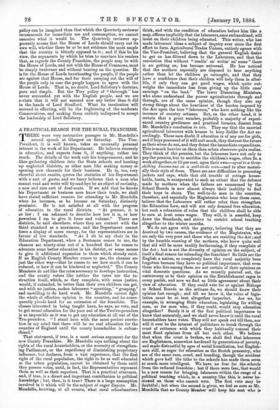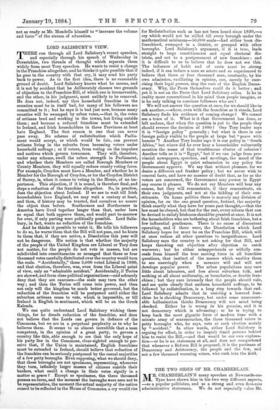A PRACTICAL REASON FOR THE RURAL FRANCHISE.
THERE were very instructive passages in Mr. Mundella's second speech at Glasgow on Saturday. The Vice- President, it is well known, takes an unusually personal interest in the work of his Department. He believes sincerely in education, and expects from it, if anything, rather too much. The details of the work suit his temperament, and he likes gathering children into the State _schools and hunting up neglected districts, as other men like making money or opening new channels for their business. He is, too, very cheerful about results, quotes the statistics of his Department with a sort of gusto, and we fancy believes that a man who cannot read and write will by-and-bye be an object of curiosity, a new and rare sort of deaf-mute. If we add that he knows his Department as business men know their trade, we shall have stated sufficient reasons for attending to Mr. Mundella when he becomes, as he became on Saturday, distinctly
pessimist. He is not satisfied at all with the progress of education in the rural districts. "At present, it is so low ; I am ashamed to describe how low it is, or how powerless I am to give it force and volume." There are districts, he said elsewhere, where they are content with the third standard as a maximum, and the Department cannot force a display of more energy, for the representatives are in favour of low standards. "As I sit in my chair in the Education Department, when a Scotsman comes to me, the chances are .ninety-nine out of a hundred that he comes to advocate some better education in his district, or some means to give it additional expansion to those which already exist. If an English County Member comes to me, the chances are just the other way—that he comes to see how much it can be reduced, or how it can be hindered or neglected." The County Members do not like the rates necessary to develope instruction, and the county voters like neither the rates nor the in- struction itself, which, as they complain, with some justice, would, if extended, be better than their own children can get, and with no justice, makes labourers "upsetting," "grasping," and unwilling to do hard work. Mr. Mundella cannot fight the whole of effective opinion in the counties, and he conse- quently pleads hard for an extension of the franchise. The classes interested in being taught have, he says, no vote, and to get sound education for the poor out of the Twelve-pounders is as impossible as it was to get any education at all out of the Ten-pounders. "I stand here with the most perfect convic- tion in my mind that there will be no real education for the counties of England until the county householder is enfran- chised."
That statement, if true, is a most serious argument for the new County Franchise. Mr. Mundella says nothing about the rights of the rural householders, or the necessity of strengthen- ing Parliament, or the expediency of diminishing proprietary influence, but declares, from a vast experience, that the first right of the rural population, the right to be as well educated as the urban population, cannot be 'obtained by them until they possess votes, until, in fact, the Representatives represent them as well as their superiors. That is a practical utterance, and, if true, is a direct and important contribution to political knowledge ; but, then, is it true ? There is a large assumption involved in it which will be the subject of eager dispute. Mr. Mundella, knowing, at all events, what rural schoolmasters
think, and with the condition of education before him like a map, affirms implicitly that the labourers, once enfranchised, will insist on their children being educated. This writer, who has made labourers' ideas a subject of inquiry ever since the first effort to form Agricultural Trades Unions, entirely agrees with the Vice-President, believing that the general English desire to get on has filtered down to the Labourers, and that the conviction that without " readin' an' writin' an' sums" there is no getting on, has become universal. He has noticed that the mothers especially are disposed to bear anything rather than let the children go untaught, and that they have a confidence that their children will help them in after- life, if only they can get good wages, which quite out- weighs the immediate loss from giving up the little ones' earnings "on the land." The lower Dissenting Ministers, who alone understand the poorer agriculturists through and through, are of the same opinion, though they also say strong things about the heaviness of the burden imposed by the Act upon the true "labourers," who have nothing like the incomes of country artisans. But, on the other hand, it is certain that a great number, probably a majority of experi- enced country gentlemen and practical farmers, dissent from Mr. Mundella's conclusion in toto. They say that the married agricultural labourers with houses to keep dislike the Act ex- ceedingly. These men doubt if education is of any use for girls, and if boys possessed of it will cart muck, they distrust the future as their wives do not, and they detest the immediate expenditure. This is much heavier on them than urban observers quite realise. They think of the pennies, but the labourers have not only to pay the pennies, but to sacrifice the children's wages, often 2s. a week altogether, or 15 per cent, upon their own—equal to a three- shilling Income-tax on a well-to-do man—and to alter materi- ally their style of dress. There are new difficulties in procuring jackets and caps, while that old trouble of cottage house- holds, boots, is exasperated to such an extent that the defence made by mothers when the fathers are summoned by the School Boards is now almost always their inability to find their boys in shoes. The well-to-do men in the counties, therefore, and especially the Magistrates who hear these cases, believe that the Labourers will rather relax than strengthen the Education Law, and will not only demand free education, but such a relaxation of rules that the children shall be able to earn at least some wages. They will, it is assert7ed, keep down the Standards, and strive to restrict school teaching altogether to the winter months.
We do not agree with the geptry, believing that they are deceived by two causes, the evidence of the Magistrates, who see only the very poor and those who are resisting the Act ; and by the humble cunning of the mothers, who know quite well that aid will be more readily forthcoming, if they complain of the Act ; but is not the diversity of opinion on the subject, of itself a final reason for extending the franchise? So little are the English a nation, so completely have the rural majority been forgotten because they have no political importance, that even those who live among them are not certain of their opinions on vital domestic questions. As we recently pointed out, the controversy as to their opinion on the Establishment rages in every parish, and now we find as little agreement about their view of education. If they could vote for or against Bishops or School Boards as the artisans do, we should know their opinion fast enough ; and till we know it, the value of legis- lation must be at best altogether imperfect. Are we, for example, in arranging State education, legislating for willing men, or for men who, if they could, would stop education altogether? Surely it is of the first political importance to know that accurately, and we shall never know it until the rural householders have votes. They will not speak out till then, nor will it ever be the interest of politicians to break through the crust of reticence with which they habitually conceal their most fixed opinions from all but each other. We believe that when the crust is broken, we shall find that labourers are Englishmen, somewhat hardened by generations of poverty, and made distrustful by ages of social humiliation, but English- men still, as eager for education as the Scotch peasantry, who are of the same race, creed, and breeding, though the accident which gave half the tithe to the schools has made them seem so much more intelligent. We have no fear for the schools from the reduced franchise ; but if there were fear, that would be a new reason for bringing labourers within the range of a political teaching which, in a country like this, is never be- stowed on those who cannot vote. The first vote may be doubtful ; but when the second is given, we feel as sure as Mr. Mundella that no County Member will keep his seat who is
not as ready as Mr. Mandella himself to "increase the volume and force" of the stream of education.



































 Previous page
Previous page